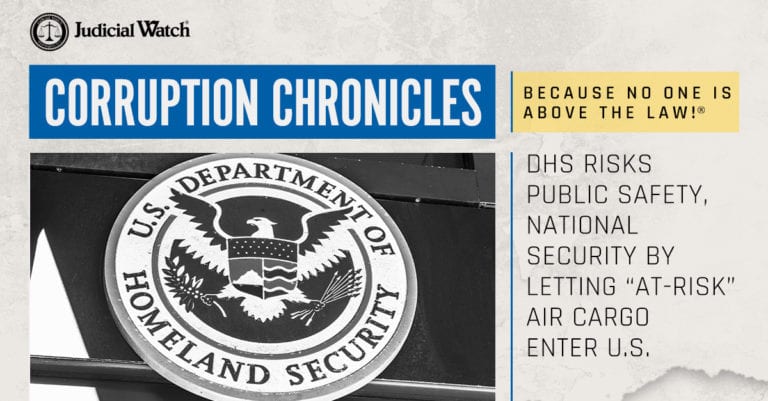
DHS Risks Public Safety, National Security by Letting “At-Risk” Air Cargo Enter U.S.

When Al Qaeda militants deployed bombs on U.S.-bound planes, the Department of Homeland Security (DHS) responded by launching a program called Air Cargo Advance Screening (ACAS) to prevent similar aviation security threats. That was a decade ago and, as is typical with many government programs, it fails miserably to accomplish its mission years after being implemented. “As a result, air carriers will continue transporting high-risk air cargo into the United States, putting public safety and national security at risk,” according to a report made public this month by the DHS Inspector General, which states the obvious in the document: “Air cargo shipments pose significant threats to national security.” DHS identifies high-risk cargo as shipment that could pose a risk to the aircraft during flight, such as unauthorized weapons, explosives, chemical and biological weapons, weapons of mass destruction or other destructive substances or items.
The 2010 foiled Al Qaeda plot sent Homeland Security officials scrambling to secure air cargo, especially since high-ranking officials openly admitted that the agency failed to meet federal standards by not screening cargo on hundreds of thousands of planes that fly over the U.S. annually. At the time, a mainstream newspaper reported that between 2,000 and 3,000 foreign flights that used American airspace to reach their destination each week were not scrutinized. Terrorists capitalized on the lapse with a sophisticated scheme to send bombs on a U.S.-bound cargo planes in October 2010. The elaborate bombs contained particularly lethal explosives, known as pentaerythritol tetranitrate or PETN, that can be easily concealed or disguised. They were stuffed in the toner cartridge and casing of computer printers and linked to an electrical circuit with a mobile phone that served as a detonator. Adding insult to injury, some of the perpetrators were terrorists jailed at the military prison in Guantanamo and released to attend a bogus Saudi Arabian “rehabilitation” program for jihadists.
The 2010 plot exposed gaping security vulnerabilities because the explosives flew aboard several international flights before being discovered. Al Qaeda “intended for the devices to explode in mid-air over the continental United States causing catastrophic damage to the aircraft, passengers, and property on the ground,” the DHS watchdog writes in its report. DHS quickly responded with a joint effort by two of its agencies, Customs and Border Protection (CBP) and the Transportation Security Administration (TSA) to help identify high-risk cargo before departing from a foreign location. Years later it became federally mandated with a Federal Register announcement explaining that ACAS will enhance the security of the aircraft and passengers on U.S.-bound flights by enabling CBP to perform targeted risk assessments on the air cargo prior to the aircraft’s departure for the United States. “These risk assessments will identify and prevent high-risk air cargo from being loaded on the aircraft that could pose a risk to the aircraft during flight,” according to the announcement. In the document the government expressed urgency, revealing that “DHS has received specific, classified intelligence that certain terrorist organizations seek to exploit vulnerabilities in international air cargo to cause damage to infrastructure, injury, or loss of life in the United States or onboard aircraft.”
Incredibly, the security initiative is not being correctly implemented by the federal agencies in charge. Investigators found that CBP does not always prevent air carriers from transporting hazardous air cargo from foreign airports into the U.S. because the agency fails to properly resolve all ACAS referrals for shipments deemed high risk. In 45% of randomly sampled referrals taken in a year, CBP and TSA failed to ensure air carriers resolved referrals and the dangerous cargo traveled anyways. Under ACAS the screening process is supposed to be complex and must be completed in a specific order and timeframe by various entities throughout the air cargo supply chain, the watchdog report reveals. Instead, weaknesses were identified in various areas, including the program’s compliance procedures. This results in air carriers failing to provide CBP flight departure information necessary to enforce ACAS compliance. “Air carriers continue to be noncompliant with program requirements,” the report states, adding that “compliance rates have worsened” since ACAS became a federally mandated program. In some instances, air carriers blow CBP off all together. In one case, investigators found an air carrier flagged for transporting dangerous materials did not respond to CBP security inquiries until nine days after the flight departed.
“Neither CBP nor TSA developed adequate policies and procedures to ensure air carriers timely and appropriately resolved referrals prior to transporting high-risk cargo,” the DHS IG found. “Specifically, we determined CBP’s existing procedures do not prevent air carriers from transporting high-risk cargo to the United States prior to resolving referrals.” The probe also determined that TSA’s security programs do not require air carriers to provide information about how they screened cargo. “As a result, the ACAS Program cannot meet its overall purpose of preventing high-risk air cargo from departing foreign locations en route to the United States,” the report says.
















